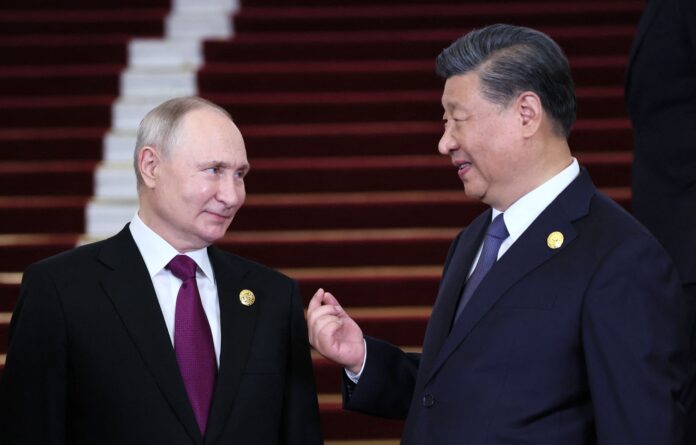Authors: Jude Blanchette and Bonny Lin
Affiliation: The Center for Strategic and International Studies
Organization/Publisher: Foreign Affairs
Date/Place: February 21, 2022/ USA
Type of Literature: Journal Article
Word Count: 2152
Link: https://www.foreignaffairs.com/articles/china/2022-02-21/chinas-ukraine-crisis
Keywords: China-Xi, Russia-Putin, Ukraine Crisis, Relations with the West, and the Limits of Chinese Foreign Policy
Brief:
The article argues that the Ukrainian crisis, which is a struggle between Russia and the West, reveals the limits of Chinese foreign policy during the Xi era. Also, the crisis reflects the critical dilemma in which China finds itself due to its strategic partnership with Russia, its support for Putin’s maneuvers in Ukraine, and the coordination of the two leaders in their countries’ policies on many global issues, especially with regard to the challenge of American global hegemony. The article also discusses the reasons behind Xi’s support of Putin’s current maneuvers and what his country could gain or lose, arguing that Beijing’s close coalition with Russia is far from wise and will have real and imminent costs to China.
The article is divided into three parts. The first part argues that China sees the ongoing Ukrainian crisis as an “unwelcome crisis” that hinders it from achieving many goals. Beijing wants to maintain strong relations with Moscow, safeguard its relationship with Ukraine, keep the EU in its economic orbit, avoid the spillover from US and EU sanctions on Moscow, and work at the same time to prevent significant deterioration of its relations with Washington. It may be able to achieve some of these goals, but achieving them all is not possible. Ukraine is an important trading partner of China, a vital gateway to Europe, and a prominent partner in the Belt and Road Initiative, which is Xi’s pioneering geopolitical endeavor. Moreover, Beijing is unwilling to openly support Russia’s territorial grabbing due to its deep fears that others will use the same logic to undermine Chinese territorial sovereignty. If Beijing allows itself to be a revisionist power in its neighborhood, it opposes other powers to adopt the same conduct, including Russia. Until now, Beijing has not recognized Russia’s annexation of Crimea in 2014. Furthermore, China realizes that any support for Russia regarding Ukraine will poison its relations with the US and the EU and put it against them. It strongly opposes the return to the Cold War atmosphere. For these reasons, the authors suggest that Xi will not give Putin the green light to invade Ukraine, which is also why China is sticking to diplomatic solutions to get out of the crisis, as it has expressed its support for the Minsk Agreement and its aftermath, and reiterated its support for “the sovereignty, independence, and territorial integrity of any country” and noted that “Ukraine is no exception.”
In the second part, the authors believe that the Ukrainian crisis will turn Beijing’s position into an incoherent position between calling for a diplomatic solution on the one hand, and providing Moscow with a “lifeline” on the other hand by buying more Russian energy and working to reduce the severity of Western sanctions imposed on it. The authors argue that China has, intentionally or not, entrenched itself within Russian revisionism through its consistent positioning with Moscow in standing against NATO and external powers attempts that are trying to “undermine security and stability in their common adjacent regions.” The authors also argue that Russia’s concerns about NATO expansion in Eastern Europe, and China’s concerns about American activity in Asia, may have given Xi a temporary sense of friendship with Putin, but that it would be at the expense of China’s relations with the West. NATO has come to see China and Russia as “two powers working together”, and Xi’s support for Putin will inflame the fears of China’s Asian neighbors about its coming steps and align them with the United States against it. Such concerns appeared recently in the statements of Asian officials, in Japan and Australia, who have seen that tolerating Russia’s invasion and use of force to change the status quo would encourage China to escalate against Taiwan and its neighbors in the East and South China Sea.
The final part questions the reason why China has stood behind Russia in the Ukrainian crisis, especially since it is aware of the negative consequences of its position on the ties with the West and Asian neighbors. The authors present a set of assumptions, for instance, Xi sincerely believes that Putin will not invade Ukraine and therefore China’s rhetorical support will not bear any costs for the country, or that the invasion will harm Russia, Europe, and the United States more than it will harm China, or that the West’s preoccupation with Russia and the Ukrainian crisis will drive them away from Asia, which will give China a greater hand in its neighborhood. However, the authors argue that such thinking is too simplistic. The repercussions of the war in Ukraine are so difficult to predict that betting on the conflict cannot be justified. Therefore, the possible real driver of Chinese thinking regarding Ukraine is related to something longer-term: “the appeal of a cozier partnership with Russia”. Xi sees this close partnership as the best way to react to a bleak security environment marked by deteriorating relations with Washington. China is taking into account that it will receive support from Russia to counter the US containment efforts against it, especially with Beijing’s regional aspirations, as it needs a major power such as Russia that provides it with a “lifeline” when it is subjected to Western pressure and sanctions, or in the event of a US-Chinese war over Taiwan. Thus, the authors see that China’s growing alliance with Russia represents a kind of “catch-22” for China—as the latter competes with the West over global order, Russia becomes a more attractive security partner.
By: Djallel Khechib, CIGA Senior Research Associate




